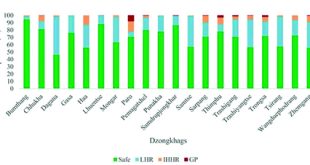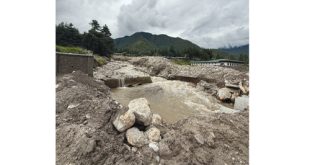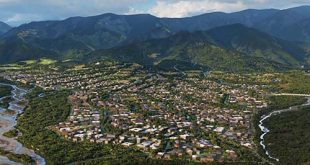
There should be 200 to 250 boulder carrying Bhutanese trucks plying everyday via Fulbari in West Bengal into Bangladesh, however, the number has been reduced to only around 50 to 60 due to a ‘hunger strike’ and ‘protest’ in Fulbari by a syndicate of local truckers, boulder exporters, clearing agents and some local goons supporting them.
The recent protests started on 15th June with three demands by the syndicate The first being that Bhutanese vehicles be completely barred from entering via the Fulbari border.
The second being mandatory trans-shipment of Bhutanese goods onto Indian trucks at Fulbari for delivery to Bangladesh, and the third demand being a cap of only 50 trucks per day allowed from Bhutan.
With none of the above three demands having any legal basis, the local authorities did not agree.
Not getting any traction, the syndicate changed track and started alleging that Bhutanese trucks are overloaded and are offloading goods in India. These are denied by the Bhutan Exporters Association (BEA) and truckers.
“The protesters’ allegations are not true and are baseless, and driven by frustration when every demand they made initially was illogical. The fact is Indian 10-wheeler trucks carries 45-47 MT, whereas Bhutanese 10-wheeler trucks carry 18-19 MT. Further, the Indian trucks have no proper documents yet they still make allegations against Bhutanese trucks for not following rules and regulations,” said an official from BEA.
The syndicate has again changed tack and now their latest demand is that Bhutanese trucks with modified bodies like a 10-wheeler being turned into a 14-wheeler should not be allowed. This is even though such modifications are allowed in both countries under the respective laws.
With most Bhutanese trucks having modified bodies, only a few are able to go.
According to boulder industry importers in Bangladesh, the real reason behind the agitation may be the declining demand for Indian boulders by Bangladeshi importers, who increasingly prefer Bhutanese stones for their superior quality and logistical efficiency.
Bhutanese trucks are fully hydraulic, saving time and labor costs, unlike many Indian exporters who rely on outdated vehicles requiring manual unloading.
Exporters emphasize that Bhutan plays no role in the import decisions of Bangladeshi traders and should not be penalized for market preferences.
The BEA has expressed deep concern over the ongoing disruptions, and is urging both the Indian and Bhutanese governments to take decisive actions.
Currently, there are 582 Bhutanese registered trucks carrying goods to Bangladesh via Fulbari Port giving a job opportunity to Indian drivers as around 90 percent of the drivers are Indian and nearly 1,000 people in Fulbari rely on Bhutanese exports for their livelihood.
Most importantly, after the implementation of the Suvidha for Bhutan, the Bhutanese exporters are paying INR 1.2 million (mn) approximately per day as Suvidha fees to the government of West Bengal only from Fulbari Border. Although the Suvidha fees via Changrabandha is being paid by Indian transporters as of now, but it has been added on the transportation and billed to exporters. Through Changrabandha, on an average INR 1.3 mn is paid to Suvidha Authority daily, meaning Bhutanese exporters are paying INR 2.5 mn as a Suvidha Fees per day to the Government of West Bengal or almost INR 1 billion in a year.
The Suvidha fees itself is highly controversial as under the Free Trade Agreement between Bhutan and India such fees are illegal. However, the West Bengal government essentially forced the fees on all Bhutanese trucks exporting any products to Bangladesh, becoming an effective illegal tax by the West Bengal government on Bhutanese exports to Bangladesh.
Despite paying around Nu 1 bn in a year to the West Bengal government, it seems that the non-tariff trade barriers and illegal demands are continuing, and local authorities are not able to intervene.
Bhutan exports a range of products including boulders, minerals, agricultural produce, herbal goods, and finished items to Bangladesh through multiple transit routes in India. These include Changrabandha and Fulbari in West Bengal, Dhubri and Jogighopa in Assam, and Dalu and Dawki in Meghalaya. Among these, Changrabandha and Fulbari are the most frequently used due to their proximity and logistical convenience.
The Fulbari route was formally designated for Bhutanese trade in 2015 by the Governments of India and Bangladesh. Bhutan began using this route in 2016, but operations have been marred by repeated disturbances from local groups with vested interests. In 2019, Bhutanese trucks were vandalized, with 37 vehicles reportedly damaged, and Bhutanese drivers assaulted. Despite filing a First Information Report (FIR) with NJP Police Station, no significant action was taken.
In 2023, the same group protested the implementation of the Suvidha digital system for cross-border trade, arguing against Bhutan’s temporary exemption. Although Bhutan sought time from authorities to develop its own system, protests escalated in early 2025, resulting in a three-month halt to exports via Fulbari. Normal operations resumed only on 8th April 2025, once Bhutanese exporters implemented their own compatible system.
The recurring obstructions at the Fulbari border continue to jeopardize Bhutan’s legitimate trade with Bangladesh. While Bhutan has consistently complied with regulations and invested in systems to facilitate smooth operations, local syndicates and unaddressed grievances on the Indian side remain a critical obstacle.
It is imperative for the Governments of India and Bhutan to work in close coordination to ensure an uninterrupted and fair trading environment, safeguarding regional cooperation and economic stability.
Update: The Bhutanese Newspaper published the above news on 21st June. The NJP police moved in today on 23rd June and arrested the protesters to allow the Bhutanese trucks through.
 The Bhutanese Leading the way.
The Bhutanese Leading the way.




